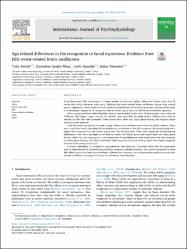| dc.contributor.author | Aktürk, Tuba | |
| dc.contributor.author | İşoğlu-Alkaç, Ümmühan | |
| dc.contributor.author | Hanoǧlu, Lütfü | |
| dc.contributor.author | Güntekin, Bahar | |
| dc.date.accessioned | 2020-04-21T08:48:43Z | |
| dc.date.available | 2020-04-21T08:48:43Z | |
| dc.date.issued | 2020 | en_US |
| dc.identifier.citation | Aktürk, T., İşoğlu-Alkaç, Ü., Hanoǧlu, L. ve Güntekin, B. (2020). Age related differences in the recognition of facial expression: Evidence from EEG event-related brain oscillations. International Journal of Psychophysiology, 147, 244-256. https://dx.doi.org/10.1016/j.ijpsycho.2019.11.013 | en_US |
| dc.identifier.issn | 0167-8760 | |
| dc.identifier.issn | 1872-7697 | |
| dc.identifier.uri | https://hdl.handle.net/20.500.12511/5188 | |
| dc.identifier.uri | https://dx.doi.org/10.1016/j.ijpsycho.2019.11.013 | |
| dc.description.abstract | Facial Expression (FE) recognition is a major marker of emotional ability. Behavioral studies show that FE recognition ability decreases with aging. Studying how event-related brain oscillations change with normal aging is important to better understand the underlying mechanisms of emotional processes. The aim of this study is to investigate changes in FE recognition due to normal aging using the EEG-Brain Oscillations approach.Fifteen young and fifteen elderly healthy subjects were included in the study. 15 photographs were used with 5 different FEs (angry, happy, neutral, sad, fearful). After each EEG recording session, subjects were asked to identify the FEs that were presented. Event-related delta, theta and, alpha phase-locking and frequency-band responses were analyzed.In the FE recognition part of the study, young subjects obtained better scores than the elderly subjects. There was a significant result regarding the locationXgroup comparison in the delta response; the young group had a higher delta response than the elderly group over the occipital area. There were significant locationXgroup differences in the theta and alpha phase locking values; the elderly group had higher theta and alpha phase locking values than the young group in the frontal area. Group differences were significant in the theta response and theta phase locking; the elderly individuals' theta response and phase locking values were higher compared to those of the young individuals.In elderly individuals, FE recognition impairment has been observed. It has been shown that the impairment may be characterized by decreased occipital delta responses and phase locking. This can be interpreted to mean that elderly individuals may have developed different brain dynamics as a compensating mechanism since they are not as efficient as young individuals in performing these functions. | en_US |
| dc.language.iso | eng | en_US |
| dc.publisher | Elsevier B.V. | en_US |
| dc.rights | info:eu-repo/semantics/openAccess | en_US |
| dc.subject | Aging | en_US |
| dc.subject | Facial Expression | en_US |
| dc.subject | EEG | en_US |
| dc.subject | Event-Related Oscillation | en_US |
| dc.subject | Delta | en_US |
| dc.subject | Theta | en_US |
| dc.title | Age related differences in the recognition of facial expression: Evidence from EEG event-related brain oscillations | en_US |
| dc.type | article | en_US |
| dc.relation.ispartof | International Journal of Psychophysiology | en_US |
| dc.department | İstanbul Medipol Üniversitesi, İMÜ Meslek Yüksekokulu, Elektronörofizyoloji Ana Bilim Dalı | en_US |
| dc.department | İstanbul Medipol Üniversitesi, Tıp Fakültesi, Dahili Tıp Bilimleri Bölümü, Nöroloji Ana Bilim Dalı | en_US |
| dc.department | İstanbul Medipol Üniversitesi, Tıp Fakültesi, Temel Tıp Bilimleri Bölümü, Biyofizik Ana Bilim Dalı | en_US |
| dc.department | İstanbul Medipol Üniversitesi, Rektörlük, Rejeneratif ve Restoratif Tıp Araştırmaları Merkezi (REMER) | en_US |
| dc.authorid | 0000-0002-7555-3801 | en_US |
| dc.authorid | 0000-0003-4292-5717 | en_US |
| dc.authorid | 0000-0002-0860-0524 | en_US |
| dc.identifier.volume | 147 | en_US |
| dc.identifier.startpage | 244 | en_US |
| dc.identifier.endpage | 256 | en_US |
| dc.relation.publicationcategory | Makale - Uluslararası Hakemli Dergi - Kurum Öğretim Elemanı | en_US |
| dc.identifier.doi | 10.1016/j.ijpsycho.2019.11.013 | en_US |
| dc.identifier.wosquality | Q2 | en_US |
| dc.identifier.scopusquality | Q2 | en_US |


















